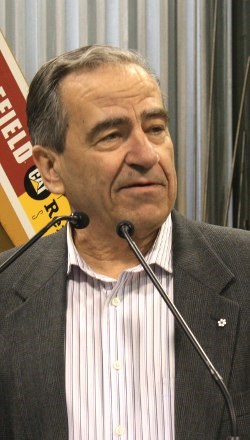The trash-to-gas folks at Elementa are now going to start processing biomass, mostly the branches and stuff left over from area logging operations, and turning that into clean synthetic gas.
The journey from wooden sticks to syngas, however, can be fraught with problems.
So the Centre for Research and Innovation in the Bio-economy (CRIBE) has stepped up to help Elementa sort things out.
CRIBE is an independent, not-for-profit research corporation that works with other relevant organizations to offer support aimed at turning research results into operational business realities.
Last week, Frank Dottori (shown), chair of the CRIBE board was at the Elementa demonstration plant in Sault Ste. Marie with Sault MP David Orazietti, to announce just over $900,000 in funding for the next phase of Elementa's research and development.
CRIBE was set up and funded by the Ontario government to help propel Ontario's green economy into the global market.
That funding will create two to three jobs in the Sault at Elementa's demonstration plant and another one or two jobs at Elementa's headquarters in Southern Ontario.
The main biomass-related problem that Elementa is working on is moisture, said Ernie Duek, the company's chief technology officer.
During the announcement and tour on Friday, Duek explained why CRIBE made a good investment.
Elementa's process produces a synthetic gas that greatly resembles natural gas and can be used as a substitute for natural gas to run turbines and generate clean energy.
It uses steam reformation to break down carbon matter from trash or from biomass, into its basic elements (carbon monoxide and hydrogen) in an endothermic reaction.
Nothing is burned.
"There is no contact between oxygen for combustion and the gas conversion process," Duek said. "If you're oxidizing, you're incinerating, even if it's only partial oxidization."
Other gasification processes that process biomass use at least partial oxidization and produce highly noxious compounds that need to be cleaned out of the gas before it can be burned to turn turbines and generate electricity.
The Elementa process produces uses indirect heat to reduce the mass of biomass or trash by ninety-eight percent.
It does it two times more efficiently than gasification and it does it in one-tenth the space and at one-quarter the price.
Byproducts of the process include heat and a fluffy completely inert, grey residue.
No stink in the air.
No gunk in the water.
Just good, clean syngas-fired electricity from plants that can be located wherever people put garbage or biomass and need electricity.
Elementa said it's going to use the money from CRIBE to replace some of the equipment at its Sault demonstration plant and to continue the data-gathering and analysis Elementa has been doing there for almost six years. Plans are still in the works for a full-scale Elementa pilot-project on Base Line in Sault Ste. Marie, but that plant will be converting Sault Ste. Marie curbside waste to create syngas, said Elementa President and Chief Executive Officer Jayson Zweirschke.
A news release from the office of David Orazietti follows.
************************* Orazietti announces $923,261 to expand local renewable energy plant and create jobs
Provincial investment supports Elementa expansion to include biomass power
SAULT STE. MARIE - The Centre for Research & Innovation in the Bio-Economy (CRIBE), which is an independent, not-for-profit research corporation funded by the provincial government, is providing $923,261 to support the expansion of Elementa Group’s waste-to-energy plant at the Sault Ste. Marie municipal waste site so it has the capacity to convert biomass waste material from forestry operations into high-quality clean energy, David Orazietti, MPP announced.
“Our government continues to support the alternative energy sector in Sault Ste. Marie by investing in innovative projects that are creating renewable energy and reducing greenhouse gases while also diversifying our economy,” said Orazietti. “In addition to the solar farms, wind farms, and co-generation projects that are transforming Sault Ste. Marie into the clean energy capital of North America, today’s provincial announcement further demonstrates our commitment to modernizing Ontario’s electricity system.”
The current Elementa process uses municipal solid waste to produce a high-quality synthetic gas (syngas).
The provincial funding for this upgrade will allow Elementa to also convert forest biomass, which is the waste material from forestry operations such as tree tops, branches and foliage, into synthetic gas.
These conversions to the existing plant will help produce clean, highly efficient energy and support the province’s work to reduce greenhouse gases.
Elementa currently employs 20 people, four of which are permanently stationed in Sault Ste. Marie and today’s announcement will create one more full-time position at the plant, as well as a number of additional local jobs collecting biomass.
“Sault Ste. Marie is surrounded by an abundant supply of renewable forest biomass and residual waste. Instead of this waste counting as an overhead cost to the industry, now we can convert it into a renewable energy source,” said Frank Dottori, chair of the CRIBE board. “This is just the beginning, with an existing infrastructure and government policy, Ontario has the opportunity to present itself as a world leader in the biomass-to-energy market.”
“Sault Ste. Marie has a rich history in the forestry industry so it is very fitting that this city be the home of biomass innovation. The Ontario government, through the forward thinking leaders of CRIBE, have demonstrated leadership in their support for alternative energy and technology development. We are truly delighted to partner with them as we advance forest biomass testing in Sault Ste. Marie” stated Elementa CEO Jay Zwierschke. “Elementa is preparing to showcase forest biomass waste as a new generation of our waste to energy technology that will re-shape the biomass industry by creating a variety of value-added energy byproducts.”
*************************
